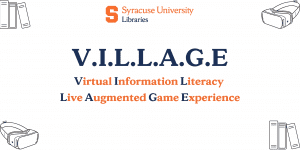 Have you ever considered what applications virtual reality and gamification can have in an educational setting? Current librarians and students at Syracuse University are investigating this premise in the Virtual Information Literacy Live Augmented Game Experience (VILLAGE) project. In an exciting collaboration of both librarians and students, this research team is working to develop a virtual reality game designed to teach information literacy.
Have you ever considered what applications virtual reality and gamification can have in an educational setting? Current librarians and students at Syracuse University are investigating this premise in the Virtual Information Literacy Live Augmented Game Experience (VILLAGE) project. In an exciting collaboration of both librarians and students, this research team is working to develop a virtual reality game designed to teach information literacy.
Juan Denzer, Lead Project Developer and Engineering and Computer Science Librarian at Syracuse University, had the initial idea to create the project, “I’ve done physical escape rooms teaching information literacy, but what if we made it virtual?” said Denzer. “We want to develop an open-source information literacy tool. We started off with it being an escape room, but it turns out that we just want to make virtual mini games that don’t necessarily have to be an escape room so they can teach things like how to properly shelve books or properly evaluate resources.”
Even before the advent of virtual reality, libraries used gamification to teach information literacy, but due to the recent boom in virtual reality, Denzer expects the future of the virtual experience to be just as intuitive as using a mobile phone. The gamification of information literacy and the integration of virtual reality is meant to teach the information in an engaging way, “We want to be able to gamify it and have these real-world experiences together that you might not get just by looking at a piece of paper,” said Denzer.
Similar research has been conducted on the application of virtual reality and virtual reality games to an academic library setting. However, this project is different due to its specific focus on information literacy. Additionally, this research is more recent and timely in comparison to older research that had been conducted with technologies that are now seriously outdated.
Chloe Guedalia, a game designer on the project and current LIS student and information literacy scholar at the iSchool said, “we are always looking for innovative ways to make learning about the library, its resources, and research more interesting. The goal was to make a virtual reality game that can make that more fun.”
Guedalia, and Rachel Hogan, a fellow LIS student, information literacy scholar, and game designer, flesh out storyboards for the games and conceptualize how the games will relate to information literacy. They also give feedback on which library concepts would incorporate well into virtual reality, and work closely with Syracuse University’s Natalie LoRusso, a Reference and User Experience Librarian and Project Manager for VILLAGE. Librarians frequently request help from students as they embark on research projects. Hogan and Guedalia were recruited for the VILLAGE project because of their proven track records as information literacy scholars.
They were both interested in assisting with the VILLAGE project in part due to previous experiences creating and implementing a physical library escape room. The escape room was created for the first year seminar program as a shared experience, where students were given clues to complete certain tasks with the ultimate goal of solving a final cipher to win the game. This experience demonstrates how gamification has been used in academic and library settings previously.
In addition to helping with game design, Hogan and Guedalia have presented a prototype of the virtual reality game at the Central New York Maker Faire 2022, “It was cool seeing the different opportunities people saw in our project, and a lot of people were excited about it,” said Hogan.
For the upcoming spring semester, the team plans to have a working prototype to conduct testing within the library using student workers and possibly librarians. In the upcoming summer and next fall, they hope to have the game available for testing with students and then eventually make the technology available to the community.
“It is kind of a slow process, which I tell my students. If you develop any game, especially since we are such a small group, it takes a little bit longer,” said Denzer. “I know talking to developers that make games, you can have 30 people on a team and it can take years”
The research team is composed of Juan Denzer, the Lead Project Manager and Developer; Natalie LoRusso, Project Manager; Chole Guedalia, Game Designer; Cheng Zhongquan (Peter), Game Developer and Designer; and Rachel Hogan, Game Designer; with special thanks to Alayna Vander Veer(‘22) for her contributions to the project.
For more information about the VILLAGE project, visit their research guide.
